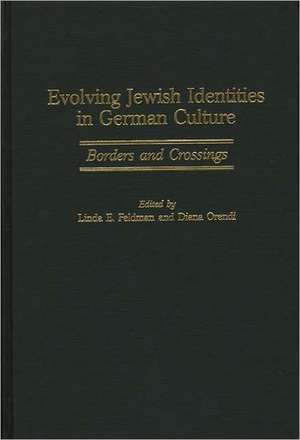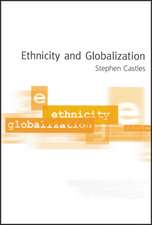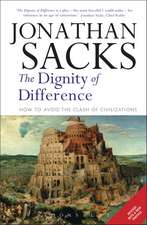Evolving Jewish Identities in German Culture: Borders and Crossings
Autor Linda E. Feldman, Diana Orendien Limba Engleză Hardback – 29 iul 2000 – vârsta până la 17 ani
Preț: 438.33 lei
Preț vechi: 604.53 lei
-27% Nou
Puncte Express: 657
Preț estimativ în valută:
83.90€ • 91.17$ • 70.52£
83.90€ • 91.17$ • 70.52£
Carte tipărită la comandă
Livrare economică 21 aprilie-05 mai
Preluare comenzi: 021 569.72.76
Specificații
ISBN-13: 9780275955571
ISBN-10: 0275955575
Pagini: 232
Dimensiuni: 156 x 235 x 24 mm
Greutate: 0.55 kg
Ediția:New.
Editura: Bloomsbury Publishing
Colecția Praeger
Locul publicării:New York, United States
ISBN-10: 0275955575
Pagini: 232
Dimensiuni: 156 x 235 x 24 mm
Greutate: 0.55 kg
Ediția:New.
Editura: Bloomsbury Publishing
Colecția Praeger
Locul publicării:New York, United States
Notă biografică
LINDA E. FELDMAN is Assistant Professor of German at the University of Windsor in Ontario, Canada. She has published works on the portrayals of Jews and women in the writings of the H.J.C. von Grimmelshausen and is currently completing a monograph on the memoirs of Glückel von Hameln.DIANA ORENDI is Associate Professor of German and Comparative Studies at Cleveland State University. She is currently developing courses on non-western literature and pursuing research interests in Holocaust studies, film studies, and issues of German-American literary relations. Her publications include a biography of Rahel Sanzara, whose novel Das Verlorene Kind she re-edited.
Cuprins
Foreword by Sander L. GilmanIntroductionDrawing Borders: Cutting and Binding Communities Regeneration of the Volkskörper and the Jew's Body: The German Körperkulter Movement at the Turn of the Century by Christopher Kenway The Palimpsestic Identity: Residual Discourses on Jews Exemplified by German Notgeld by Sonja M. HedgepethReconciliation before Auschwitz: The Weimar Jewish Experience in Popular Fiction from the Israelitisches Familienblatt by David BrennerBinding Together by Cutting Apart: Circumcision, Kafka, and Minority Discourse by Stephen TaubeneckBridges and Gulfs: Intergenerational Ruptures and ConnectionsFrom Big Daddy to Small Literature: On Taking Kafka at His Word by Scott Spector"A Frosty Hall of Mirrors": Father Knows Best in Franz Kafka and Nadine Gordimer by Iris BruceNarrative Strategies to Disclose Pious Lies in the Works of Irene Dische by Diana OrendiThrough a Distant Lens: Cultural Displacement, Connection, and Disconnection in the Writing of Maxim Biller by Linda E. FeldmanRedrawing Borders: Redefining Jewish Identity"My Ears Repeat": Interpretive Supplementarity in Esther Dischereit's Novel Joëmis Tisch: Eine judische Geschichte by Sabine I. GölzZapping Jews, Zapping Turks: Microchip Murder and Identity Slippage by Linda E. FeldmanThe New Expatriates--Three American-Jewish Writers in Germany Today by Diana OrendiAn Entrepreneur of Victimhood: Jewish Identity in the Confessions of a Stasi Informant by Denis SweetFurther ReadingIndex















